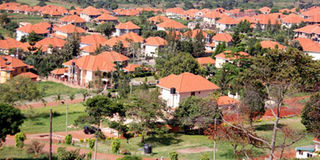Residential property prices rise by 1.2%

Rise in property rates. Prices of properties in Greater Kampala increased in 2019, according to Uganda Bureau of Statistics. FILE PHOTO
What you need to know:
- Last year, a Knight Frank report noted a 7 per cent increase in rent prices for two bedroom units with occupancy rates in Kampala alone registering a 2 per cent growth on the premise of a “soft” market, enabling customers to drive harder bargains for lower rental rates alongside good location, accessibility and ample parking.
Price of residential properties in Greater Kampala Metropolitan Area rose up by at least 1.2 per cent in the year ended December 2019, according to a survey by Uganda Bureau of Statistics (Ubos).
Great Kampala Metropolitan Area, according to Ubos, covers Kampala and some urban areas of Wakiso District.
While releasing findings of the survey in Kampala, Mr Sam Kaisiromwe, the Ubos senior statistician price statistics, said the Residential Property Price Index for Greater Kampala Metropolitan Area, indicated a property price increase of 1.2 per cent.
However, this was lower than the 5.2 per cent price increase registered 2018.
The increase, he said, was more pronounced in Kampala and Makindye, which registered a price upsurge of 6.8 per while in Kawempe and Rubaga property prices rose by 5 per cent.
However, in Nakawa and parts of Wakiso property prices registered a decline of -3.4 per cent resulting from low demand in the period.
Residential properties consist of homes, apartments, townhouses and condominiums. Ubos uses existing factors, which might be internal or external, to determine property price.
Year-on year quarterly Residential Property Price Index price changes, Mr Kaisiromwe said, saw property rates for the last two quarter of 2019 decline to 0.5 per cent, compared to 3.2 per cent recorded in quarter one of 2019.
This, he said, was precipitated by the -6.5 per cent decline registered in Wakiso District compared to -3 per cent registered in the first quarter of 2019.
A report by Knight Frank released last year noted that rent for three-bedroom apartments had reduced due to increasing supply.
However, this was despite reports of an existing housing deficit that Uganda has been grappling with in over a decade.
According to the report, there is a surplus in supply of three-bedroom apartments, which culminated into a reduction in rent prices.
“Knight Frank Research registered a 5 per cent decline in average rent for three-bedroom apartments from,” the report noted.




